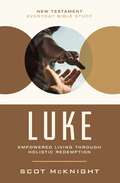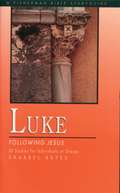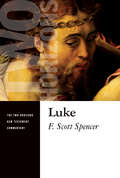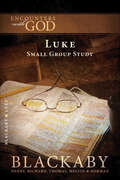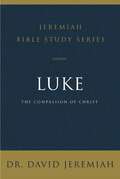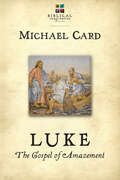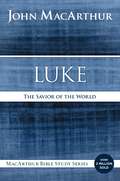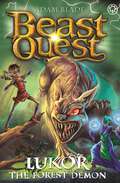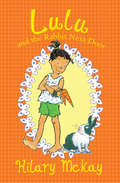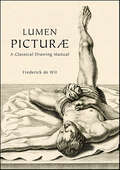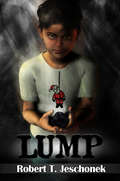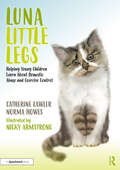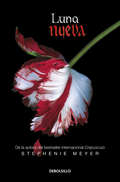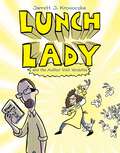- Table View
- List View
Luke: 26 Studies For Individuals Or Groups (N. T. Wright for Everyone Bible Study Guides)
by N. T. Wright Patty PellWith a scholar's mind and a pastor's heart, N. T. Wright guides us through the New Testament book of Luke, showing how we can particpate in Luke?s story by making it real in our own world. Twenty-six sessions for group or personal study.
Luke: An Introduction and Commentary (Tyndale New Testament Commentaries #Volume 3)
by Nicholas PerrinIn this insightful and accessible commentary, Nicholas Perrin explores the many unique pictures of Jesus found in the Gospel of LukeLuke: An Introduction and CommentaryIntroductionAnalysisCommentaryAdditional Notes
Luke: Empowered Living Through Holistic Redemption (New Testament Everyday Bible Study Series)
by Scot McKnightUnleashing God's Kingdom"Scot McKnight is one of my absolute favorite New Testament scholars and his Everyday Bible Study series is akin to Einstein creating a user-friendly version of the Theory of Relativity!"—Lisa Harper, award-winning author and Bible teacherEvery paragraph in Luke&’s gospel is about Jesus. Luke showcases Jesus&’ character by recounting all the significant events of his life, recalling his major teachings, and recommending his character as the truest way to live. The Jesus in Luke&’s biography doesn&’t wait for these events to happen to him, instead Jesus powerfully moves and unleashes the kingdom of God, proclaiming—and demonstrating—holistic redemption. This redemption cannot be reduced to ethics, morality, or even what we call social justice. Its foundation is a Person, and in that Person holistic redemption explodes into living realities. Those who follow this Person suddenly realize they are on mission with Jesus, as Luke tells his great story.In this deep dive into the person of Jesus, Scot McKnight shows that the Christian movement today, just as it was in Jesus&’ time, is empowered by the Spirit of God. Explaining the links between the Bible&’s world and ours, McKnight explores the enduring relevance of the Gospel of Luke for today.In the New Testament Everyday Bible Study Series, widely respected biblical scholar Scot McKnight combines interpretive insights with pastoral wisdom for all the books of the New Testament. Each volume provides:Original Meaning. Brief, precise expositions of the biblical text and offers a clear focus for the central message of each passage.Fresh Interpretation. Brings the passage alive with fresh images and what it means to follow King Jesus.Practical Application. Biblical connections and questions for reflection and application for each passage.
Luke: Following Jesus (Fisherman Bible Studyguide Series)
by Sharrel KeyesFollowing Jesus--what an exciting spiritual adventure! But Jesus said faithfulness to Him means putting aside personal priorities. Readers will discover how to have the faith to follow.From the Trade Paperback edition.
Luke: Jesus is Savior (Meditative Commentary #3)
by Earl LavenderDo you want a deeper, more fulfilling way of Bible study? Do you want to know God through Scripture—not just to know the teachings, but to have a relationship with the Teacher? Perhaps you want to begin daily Bible reading, but need guidance. Or you need a guide for family Bible study. Or your small group Bible study needs revitalizing.This meditative commentary is for you. There are many commentaries on the books of the Bible and workbooks for Bible study, but this series is different. It employs the classic Christian method of “holy reading” to help you hear the voice of God.Holy reading involves slowly engaging a short passage of Scripture, listening closely, reading repeatedly, praying the words, and perhaps sharing with fellow believers. God will bless us, our families, and our churches if we take the time to be still, listen, and do his word.
Luke: Selected Essays (Gorgias Handbooks Ser. #26)
by F. Scott SpencerThe story Luke tells in his gospel, says F. Scott Spencer, is &“a compelling, complex narrative confession of faith in God. To what degree anyone joins Luke in that faith journey is up to them, but any responsible interpreter must attend considerately to Luke&’s theological roadmap.&”In this latest addition to the Two Horizons New Testament Commentary series, Spencer integrates close textual analysis of Luke&’s unfolding narrative with systematic theology, spiritual formation, philosophical inquiry, and psychological research. With section-by-section commentary, Spencer highlights the overriding salvific message that runs through Luke&’s gospel. Pastors, scholars, and students alike will benefit from Spencer&’s insight into Luke&’s theological significance.
Luke: Small Group Study (Encounters with God)
by Henry Blackaby Richard Blackaby Melvin Blackaby Thomas BlackabyIntended as companions to the Blackaby Study Bible, these guides also stand alone as a complete study of a book of the Bible.The lessons include: Leader's Notes7 studies based on reference materials included in the Blackaby Study BibleAn explanation and interpretation of Scripture A story that illustrates the passage in focus Other Bible verses related to the theme Questions for reflection Suggestions for application in everyday life.
Luke: The Compassion of Christ (Jeremiah Bible Study Series)
by Dr. David JeremiahJesus is the Great Physician...Follow Dr. Jeremiah through the gospel of Luke in a chapter-by-chapter study that will help you understand what it meant to the people at the time it was written, and what it means to Christians today. According to the apostle Paul, Luke was a "beloved physician" who traveled with him on several of his missionary journeys. However, Luke's real passion was in setting down an orderly account that detailed the birth, ministry, death, and resurrection of Jesus. This was a task for which Luke was well suited, for he was both a thoughtful man of science and a great observer of people.Luke took great care in relating the information he collected, but he also emphasized the care that Jesus, as the Great Physician, extended to people everywhere—both Jewish and Gentile alike.Each of this study's twelve lessons is clearly organized to include:Getting Started: An opening question to introduce you to the lesson.Setting the Stage: A short reflection to explain the context of the study.Exploring the Text: The Scripture reading for the lesson with related study questions.Reviewing the Story: Questions to help you identify key points in the reading.Applying the Message: Questions to help you apply the key ideas to their lives.Reflecting on the Meaning: A closing reflection on the key teachings in the lesson.—ABOUT THE SERIES—The Jeremiah Bible Study Series captures Dr. David Jeremiah's forty-plus years of commitment in teaching the Word of God. In each study, you'll gain insights into the text, identify key stories and themes, and be challenged to apply the truths you uncover to your life. By the end of each study, you'll come away with a clear and memorable understanding of that Bible book.Each study also contains a Leader&’s Guide.
Luke: The Gospel of Amazement (The Biblical Imagination Series)
by Michael Card"His father and mother were amazed at what was being said about Him." Luke 2:33 "Everyone was amazed at all the things He was doing." Luke 9:43 "He went home, amazed at what had happened." Luke 24:12 From start to finish, the book of Luke is filled with amazement. Throughout the life and ministry of Jesus, those who met him were astonished by their encounter, from the shepherds at the nativity to the disciples at the empty tomb. With careful attention to detail, Michael Card embarks on an imaginative journey through the Gospel of Luke. He introduces us to Luke the historian and imagines his life as a Gentile, a doctor and a slave. Card explores Luke's compelling account of this dynamic rabbi who astounded his hearers with parables and paradoxes. What might Luke have experienced as he interviewed eyewitnesses of Jesus? What leads Luke to focus on the marginalized and the unlikely? Why does Luke include certain details that the other Gospel writers omit? Join Michael Card in the work of opening heart and mind to the "Gospel of Amazement."
Luke: The Savior of the World (MacArthur Bible Studies)
by John F. MacArthurThe Gospel of Luke tells the story of Jesus from a perspective unlike any other. Pastor John MacArthur will take you through Luke's account of the gospel, passage by passage, so that you can better understand everything from Luke's specific audience to the detailed portrayal of Jesus' ministry. As a physician, Luke presents a detailed account of Jesus' conception and birth. As a meticulous historian, he highlights Jesus' parables, teachings, healings, and compassion to the outcasts in Israel. He follows Christ on His journey to the cross, recounts His last days that led to His crucifixion and burial, and documents Christ's victory over the grave.From the beginning of Jesus' public ministry to the Lord's final words, Luke stresses Jesus' willingness to go to the cross to complete His ultimate mission—to be the Savior of all the world.—ABOUT THE SERIES—The MacArthur Bible Study series is designed to help you study the Word of God with guidance from widely respected pastor and author John MacArthur. Each guide provides intriguing examinations of the whole of Scripture by examining its parts and incorporates:Extensive, but straight-forward commentary on the text.Detailed observations on overriding themes, timelines, history, and context.Word and phrase studies to help you unlock the broader meaning and apply it to your life.Probing, interactive questions with plenty of space to write down your response and thoughts.
Lukor the Forest Demon: Series 29 Book 4 (Beast Quest #1077)
by Adam BladeFree the Beasts. Live the Adventure.Battle Beasts and fight Evil with Tom and Elenna in the bestselling adventure series for boys and girls aged 7 and up!Katya and Daltec journey to her village near the forests of Tangala to find and fight a terrifying new beast called Lukor - a giant lynx. They must defeat the beast to save Katya's home and to find the final healing ingredient that can save Tom from Malvel's evil curse.There are FOUR thrilling adventures to collect in the latest set of this beloved series - don't miss out!If you like Beast Quest, check out Adam Blade's other series: Team Hero, Sea Quest, Beast Quest: New Blood and Space Wars.
Lukor the Forest Demon: Series 29 Book 4 (Beast Quest #1077)
by Adam BladeFree the Beasts. Live the Adventure.Battle Beasts and fight Evil with Tom and Elenna in the bestselling adventure series for boys and girls aged 7 and up!Katya and Daltec journey to her village near the forests of Tangala to find and fight a terrifying new beast called Lukor - a giant lynx. They must defeat the beast to save Katya's home and to find the final healing ingredient that can save Tom from Malvel's evil curse.There are FOUR thrilling adventures to collect in the latest set of this beloved series - don't miss out!If you like Beast Quest, check out Adam Blade's other series: Team Hero, Sea Quest, Beast Quest: New Blood and Space Wars.
Lulu Goes to Witch School (I Can Read Level 2)
by Jane O'ConnorIn this funny Halloween story for beginning readers, Lulu the witch girl is a little nervous about her first day of school, but she heads off with her broom and Dracula lunch box. She immediately loves her new teacher, Miss Slime, especially her wart. Lulu’s first flying lesson around the cemetery goes great!There’s only one thing she doesn’t like about witch school: curly-haired Sandy Witch, who seems to do everything better than Lulu.Funny, spooky Lulu Goes to Witch School is a Level Two I Can Read book, geared for kids who read on their own, but still need a little help. Perfect for both Halloween and back to school reads, this classic story has been given fresh illustrations by Bella Sinclair in this beautiful new edition.
Lulu and the Cat in the Bag
by Hilary Mckay Priscilla LamontWhen a mysterious bag is left on Lulu's doorstep, the last thing her grandmother expects to be in it is a cat--a huge, neon orange cat. But Lulu knows this cat doesn't mean any harm and in fact it needs a lovely new home.
Lulu and the Rabbit Next Door
by Hilary Mckay Priscilla LamontWhen Lulu's nextdoor neighbor doesn't seem to be looking after his rabbit properly, Lulu and her cousin Mellie devise a scheme to make him pay more attention to his pet.
Lulu and the Witch Baby (I Can Read Level 2)
by Jane O'ConnorIt's just not fair! No matter what a mess she makes, nobody ever gets mad at Witch Baby. Nobody except Lulu Witch, who cooks a magic brew that makes her baby sister disappear.But then she begins to worry that Mama Witch will get mad—very mad. Can Lulu wish Witch Baby back? Beginning readers will love this classic tale from Fancy Nancy author Jane O'Connor about children learning to welcome new siblings. With plenty of humor and witchy magic, Lulu and the Witch Baby is a level two I Can Read book, perfect for kids who read on their own but still need a little help.
Lulu va à la fête foraine: Un livre pour les garçons et les filles à partir de 6 ans
by A. P. HernándezLa fête foraine est encore là ! Lulu et son petit frère Nico se préparent à s'amuser comme des fous, et Valentine, la meilleure amie de Lulu, va venir elle aussi. Ils se préparent à dévorer des gaufres au chocolat, à faire un tour dans la grande roue et à embarquer à bord du bateau pirate. Cependant, ils vivront une aventure qu'ils n'auraient jamais pu imaginer.
Lumen Picturae: A Classical Drawing Manuel
by Frederick de WitLumenPicturaeis apictorial guide to classicaldrawing as exemplified by the sublime work of the influential 17th centuryDutch engraver Frederick de Wit. Presenting a carefully curated set of imagesnever before seen outside of rare book archives, Lumen Picturaerenders de Wits’ incomparable figure drawings available to the public forthe first time. In the tradition of Harold Speed’s The Practice and Scienceof Drawing, Andrew Loomis’s Figure Drawing for All It’s Worth,Gottfried Bammes’ Der NackteMensch, and George Bridgman's Complete Guide to Drawing from Life,the step-by-step visuals in Lumen Picturae arean indispensible handbook for visual artists both professional and amateur, andfor readers of any age or language who want to incorporate the incomparableinsight of classical Dutch figure studies into their drawing today.
Lump
by Robert T. Jeschonek Ben BaldwinA twisted modern fable from award-winner Robert T. Jeschonek, author of the Booklist Top Ten First Novel for Youth My Favorite Band Does Not Exist. Meet a kid so bad, he gets a lump of coal for Christmas every year...and likes it! Neighborhood bully Buzz Scanlan takes pride in his annual lump, which he sees as a black badge of badness. But this year, when the coal doesn't come, the ten-year-old holy terror becomes a bad boy on a mission. He roams from one victim of his wicked mischief to the next, digging for dirt on the one nice thing he must have done to deserve no coal. When everyone agrees he's been nothing but naughty, he nearly gives up the hunt...until he stumbles onto the shocking truth behind his lumps of coal, an incredible secret that just might change his life forever. Will Buzz get his lump after all, sealing his fate as the ultimate bully? Or will solving the mystery lead to a fate worse than death for the naughtiest boy, an unexpected good deed that breaks his not-nice record? Don't miss this fun and funny tale with a twist from award-winning author Robert T. Jeschonek.
Luna Little Legs: A Professional Guide (Luna Little Legs: Helping young children to understand domestic abuse and coercive control)
by Catherine Lawler Norma HowesFor effective and safe use, this book should be purchased alongside the professional guidebook. Both books can be purchased together as a set, Helping Young Children Learn About Domestic Abuse and Coercive Control: A Luna Little Legs Storybook and Professional Guide [9781032072555] This sensitively written storybook has been created to help very young children understand about domestic abuse and coercive control. Luna loves playing with her friends at kitten club, but at home things are different. One terrible night, Luna overhears a domestic abuse incident and, when her own name is mentioned, she wonders if it might be her fault. Accompanied by beautiful and engaging illustrations, the story provides a vehicle for talking with children about their experiences, safety and emotional wellbeing. Three potential endings allow the story to be personalised to the individual child: • In ending 1, Luna is comforted by her mummy and remains at home • In ending 2, Luna and her mummy move to a refuge, and eventually into their own home • In ending 3, Luna’s daddy apologises for his behaviour promising to change , and she and her mummy move back into the family home Through age-appropriate rhyming language, this story explores children’s common reactions to domestic abuse, shows them that they are not alone, and helps them talk about their feelings. It is an essential tool for all early years practitioners, as well as professionals working with children and families who are experiencing, or have experienced, domestic abuse and coercive control.
Luna nueva (Crepúsculo #2)
by Stephenie MeyerNúmero 1 en la lista de bestsellers de The New York Times y de USA Today. Mejor Novela Young Adult de Todos los Tiempos por la revista Time.La Saga Crepúsculo, en la que se incluyen los títulos Crepúsculo, Luna nueva, Eclipse y Amanecer, ha vendido ya cerca de 155 millones de copias en todo el mundo y más de 3 millones de ejemplares solo en España.Para Bella Swan hay una cosa más importante que su propia vida: Edward Cullen. Pero enamorarse de un vampiro es más peligroso de lo que Bella podría haber imaginado. Edward ya ha rescatado a Bella de las garras de un diabólico vampiro, pero ahora, a medida que su arriesgada relación amenaza todo lo que es cercano y querido para ellos, se dan cuenta de que quizás sus problemas no hayan hecho nada más que empezar...
Luna nueva (Crepúsculo #2)
by Stephenie MeyerPara Bella Swan hay una cosa más importante que su propia vida: Edward Cullen. Pero enamorarse de un vampiro es más peligroso de lo que Bella podría haber imaginado. Edward ya ha rescatado a Bella de las garras de un diabólico vampiro, pero ahora, a medida que su arriesgada relación amenaza todo lo que es cercano y querido para ellos, se dan cuenta de que quizás sus problemas no hayan hecho nada más que empezar...
Luna's World #1 Library Dreams
by Hayley GannonHi, I'm Luna! This diary you're reading? My mum's idea. She said it will help me to focus. You see, my mind is always racing with a million thoughts! I have so much I want to say and do! So, I'm going to use this diary to show you EVERYTHING that's going on in my world ...Luna Merrian is a ten-year-old with BIG dreams. This year, Luna is desperate to become a library monitor. AKA a Little Librarian! The only problem? Her school enemy: Jade Jones. There can only be ONE Little Librarian from their class, and Luna has three chances to prove that she's the best person for the job. But the contest between Luna and Jade reveals parts of Luna that she's not proud of ... Will Luna ever achieve her library dream? Become part of Luna's world in this brand-new illustrated diary series for fans of Ella Diaries and Diary of a Netball Star.
Lunch Bunnies
by Kathryn LaskyClyde, the rabbit, is ready to start school, but after talking with his brother, he is worried about what will happen at lunchtime.
Lunch Lady and the Author Visit Vendetta: Lunch Lady #3 (Lunch Lady #3)
by Jarrett J. KrosoczkaFrom the author of National Book Award finalist Hey, Kiddo.Dee, Terrence, and Hector are very excited about Author Visit Day. Lewis Scribson is the author of the famous Flippy Bunny books, and Hector is a huge fan! And it gets Dee and Terrence out of math class. But something is a little off about this special guest. And Coach Birkby, the gym teacher, mysteriously disappears the day of his visit. What evil designs does this world-famous writer have on his agenda? Lunch Lady&’s going to get to the bottom of it, even if she has to kick some bunny butt!


